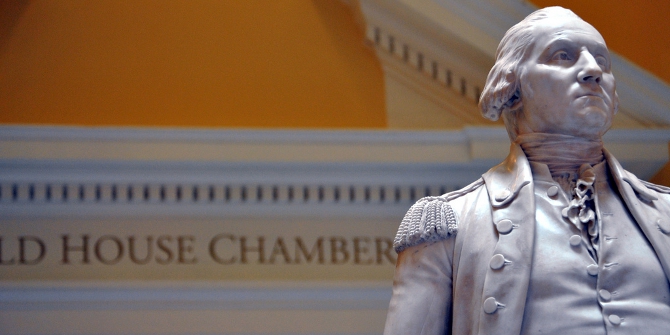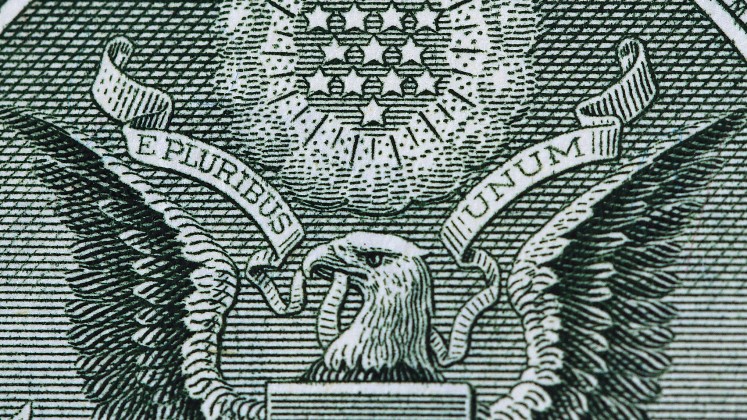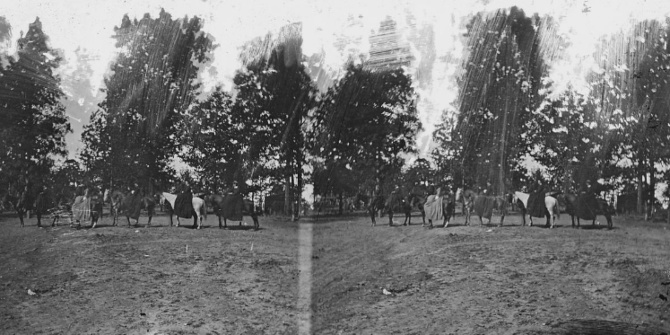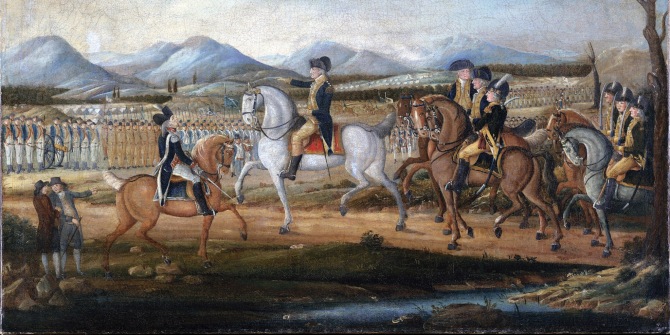 President Obama’s announcement late last month that U.S. forces would begin bombing the forces of the Islamic State in Iraq and Syria marked a decisive shift towards intervention for his administration. Irina Somerton argues that Obama’s indecisiveness and reluctance to pursue a more muscular Foreign Policy needs to be seen in the context of America’s deep-rooted Isolationism. She writes that this Isolationism, which began over four centuries ago, during 177 years in which the future USA was a group of British colonies, was reinforced after independence by George Washington’s warnings against “Foreign Entanglements”.
President Obama’s announcement late last month that U.S. forces would begin bombing the forces of the Islamic State in Iraq and Syria marked a decisive shift towards intervention for his administration. Irina Somerton argues that Obama’s indecisiveness and reluctance to pursue a more muscular Foreign Policy needs to be seen in the context of America’s deep-rooted Isolationism. She writes that this Isolationism, which began over four centuries ago, during 177 years in which the future USA was a group of British colonies, was reinforced after independence by George Washington’s warnings against “Foreign Entanglements”.
From the end of the Second World War in 1945 until the end of the Cold War in 1991, American Isolationism seemed to have ended. During World War Two and the Cold War which followed, America had a clear role as the leader of ‘the free world’. However, although it has reigned as the world’s only Superpower since the disintegration of the Soviet Union in 1991, America’s vision of its international role is no longer clear. There are several reasons for that lack of clarity concerning the USA’s assessments of its Foreign Policy options, obligations and choices, and for the ambivalence that often clouds those assessments.
For one thing, it is important to recognize that the USA did not have a perceived role in the world until the end of the Second World War, when the Pax Brittanica was replaced by the Pax Americana. For another, from 1945 to 1991, both the potential adversary that the USA might have had to confront, and America’s responsibility to protect its NATO allies in the event of an attack on them, were perfectly clear.
However, since 1991 many of the crises that have occurred have had complex, often murky origins and ambiguous objectives, and as for the players, it has often been difficult to distinguish the ‘good guys’ from the ‘bad guys’; that is certainly true in the crisis-ridden areas that are the focus of American attention today: Syria, Iraq, Ukraine.
In the post-Cold War era, one of the principal reasons for America’s lack of clarity regarding its Foreign Policies has been that neither the obligations nor the choices have been clear. What is more, the USA’s ambivalence about Foreign Policy is chronic, or more precisely it has been chronic since 1991, with the collapse and breakup of the Soviet Union and the end of the Cold War. In that context, it is important to keep a key factor in mind:
The driving force underlying America’s post-Cold War ambivalence about its presumed Foreign Policy obligations is its long history of Isolationism, which pre-dates by 338 years America’s perceived post-Second World War responsibility to be involved in world affairs.
The Source of American Isolationism
The source of American Isolationism can be precisely dated to the planting of its seed in what would eventually become the United States America, on the 13th of May 1607, when a ship carrying a group of about 100 Englishmen landed on the coast of Virginia, at what they named Jamestown (in honour of King James the 1st) and founded England’s first American colony – also the very first colony of the future British Empire. Those colonists and the thousands of their countrymen and women that followed them to America during the 17th and 18th centuries were isolated from England by the vast distance across the Atlantic and by the difficulty of making the crossing.
The source of the longstanding American tendency towards Isolationism can thus be found in the USA’s origin as Britain’s thirteen American colonies. During the 177 years between the establishment of the first colony in Virginia and the formalization of the independence of the American colonies from Britain in 1784, the future United States had neither the inclination nor the right to have a Foreign Policy. By the time that the first government of the new United States of America was established in 1789, a sense of detachment from the outside world, and lack of interest in it, was a longstanding habit.
The Influence of George Washington
A key factor that has kept Isolationism embedded in the American national consciousness, has been the historical impact of the pejorative connotation of the phrase ‘Foreign Entanglements’ or ‘Entangling Alliances’, which was coined by George Washington in his Farewell Address, delivered before the US Congress in the then capital of Philadelphia in 1796, near the end of his second term as President. Washington was not just America’s first President; he was also the commanding General who had led and won the fight for American independence. Since that time he has been and is still idolized as ‘the Father of the Country’.

Washington’s Farewell Address quickly became very well known to the American people, as re-written versions of the speech were soon published in newspapers – first in Philadelphia and then in newspapers in other American cities – as a sort of Open Letter, addressed to “Friends and Fellow-Citizens”.
Washington was suspicious of the motives of foreign countries that sought alliances with the new USA, and his hostility to foreign alliances has been a powerful driver of American Isolationism. In addition, his negative characterization of Foreign Policy as a Foreign ‘Entanglement’ has had an enormous influence on the development of a negative national view of Foreign Relations and Foreign Policy since the late 18th century.
The overriding concern of Washington’s Farewell Address was his fervent belief that the Union, and the common interests, ideals and principles it embodies, should be valued above local or state interests, and that loyalty to the Union must take precedence over loyalty to one’s state. He believed passionately in the importance of preserving the Union.
In addition, he warned against the destructive potential of political parties and factionalism, and warned even more strongly against “Foreign Entanglements”, which could be dangerous or damaging to the United States, its interests, its Union.
Since 1896, the reading aloud of the Farewell Address in the US Senate has taken place every year on Washington’s birthday, and that annual reading has become a revered Senate tradition. Moreover, that annual repetition of Washington’s warnings about “Foreign Entanglements” must serve to reinforce the isolationist tendencies of many of the Senators; that is important, in view of the fact that the US Constitution gives the Senate the sole responsibility for the ratification of all agreements or treaties signed with foreign countries by any US President.
American Foreign Policy Now
Today, there are three principal factors that both influence and complicate America’s Foreign Policy decisions – or non-decisions.
1. America has a Perceived Responsibility, as the World’s only Superpower, to play the leading Foreign Policy Role in the world.
2. America’s deep-rooted Isolationism, which is historically rooted in its colonial past and goes back hundreds of years, has the effect of discouraging the USA from playing a leading Foreign Policy role.
3. America’s Chronic Ambivalence regarding “Foreign Entanglements” in a changing and uncertain world, is the consequence of those two mutually contradictory factors.
Clearly, there are contradictions between on the one hand, America’s traditional, longstanding, deep-rooted Isolationism, and on the other hand, its perceived responsibility today, as the world’s only Superpower, to exercise leadership through Foreign Policy.
That ambivalence has been particularly conspicuous recently, during President Obama’s hesitations about deciding what his foreign policy is or should be concerning the rise of what is now called ‘the Islamic State’ or ‘IS’. Obama’s hesitancy was, at the same time, the classical American ambivalence about Foreign Policy, an ambivalence driven by Isolationism, by a desire not to get involved in the world’s problems.Nevertheless, it must be said that with regard to the present situation in Iraq and Syria, the degree of Obama’s ambivalence, his hesitations, his reluctance to form a policy for dealing with Isis, gave them time to take control of vast areas of Iraq and Syria and to morph into the even more murderous and evil Islamic State.
As the Washington Post has often vitriolically pointed out, and as the New York Times has also stated, somewhat more politely, Obama should not have needed to dither and hesitate for well over a year before figuring out what his foreign policy should be, on dealing with the terrorist actions of ISIS in Iraq and Syria, and on their threat to America and its allies. After ISIS murdered two American journalists in a gruesome way, Obama finally announced actions to deal with them, but he still appeared to be more reluctant than resolute, more detached than determined.
Finally, Obama has at last pulled himself together and ordered massive strikes by the US Air Force on Islamic State’s territories in Iraq, and on the IS-controlled territories in Syria. Better late than never, but those two journalists, and thousands of other innocent victims of IS and other Al Qaeda offshoots, could be alive today if Obama had ordered the same actions a year ago.
What is more, Obama has failed to form a policy about the crisis in Ukraine, other than to lay on further sanctions. Russia’s President, Vladimir Putin is not exactly quaking in his boots. Indeed Putin’s decision to pull Russian troops back from the border with Ukraine has been part of a power game, demonstrating that in the vacuum of Obama’s failure to have a policy on Ukraine, he can pose a threat and can withdraw the threat at will.
Obama’s reluctance and ambivalence about having an interventionist Foreign Policy is more extreme than that of any other President since the Second World War, and it has earned him very harsh and well deserved criticism in the American press, as well as extremely low approval ratings from the American people.
Examples of Chronic American Ambivalence about Foreign Policy
That ambivalence was present a century ago, for example, after the end of the First World War, in 1919, when the very isolationist US Congress refused to agree to the membership of the United States in the newly created League of Nations, which had been the brainchild of the President, Woodrow Wilson.
It was very much present in the early years of the Second World War – September 1940 to December 1941, when President Roosevelt needed to persuade a very Isolationist Congress that helping Britain to survive and to defend itself by shipping food and weapons to her was in America’s interest. Fortunately, FDR was a master of political persuasion.
A more recent example of American Foreign Policy ambivalence having been driven by isolationism was President Bush Senior’s decision in the Gulf War in 1991 – against the advice of his military commanders – to call a halt to the offensive once Kuwait was liberated, instead of continuing the advance into Iraq and defeating Saddam Hussein.
Another example was President Clinton’s prolonged hesitation in the mid-1990s, over intervening in the Bosnian war. He finally used US air power in 1995, to drive the Serbs out of Bosnia, but many Bosnian casualties could have been avoided if he had acted sooner.
President Obama is not the first US President to be ambivalent about Foreign Policy, but he has been by far the most detached and indecisive since the end of the Cold War. Perhaps George Washington’s warnings against “Foreign Entanglements” have been Obama’s Foreign Policy manual.
However, it is more than likely that Washington – the commanding General who won the War of Independence – would not have avoided the need, as President, to be decisive about Foreign Policy, in the face of the Clear and Present Dangers facing America today. Washington would have accepted the responsibility of the Pax Americana, and would have acted, reluctantly but decisively.
This article is based on a talk given at the LSE US Foreign Policy Conference held on September 17-19th, 2014.
You can watch video highlights from the conference in the player below:
Please read our comments policy before commenting.
Note: This article gives the views of the author, and not the position of USApp– American Politics and Policy, nor of the London School of Economics.
Shortened URL for this post: http://bit.ly/1yc92g2
_________________________________
 Irina Somerton – University of London
Irina Somerton – University of London
Dr Irina Somerton is an independent research scholar affiliated with the Institute of Historical Research at the University of London, where she was previously a Fellow of the Institute of United States Studies. Dr. Somerton also performed research in international relations as a member of the Royal Institute of International Affairs in London and is a former Lecturer at the University of London and a former Speaker for the U.S. Embassy in London. She has recently been acting as an Independent Consultant on two major agricultural trade conflicts between the EU and the US.






